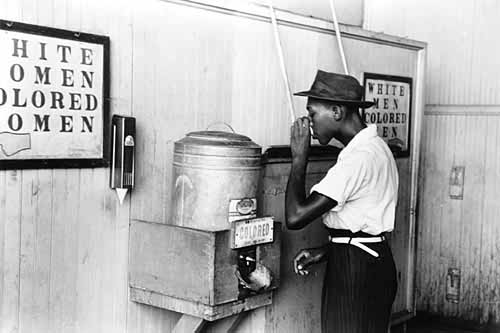
History 2710 MacKay
Civil Rights, 1950-1960s

Oklahoma City, Oklahoma, July 1939: "Colored" water fountains were fixtures throughout the South during the Jim Crow era. (Source: PBS History of Jim Crow, Image Gallery)
The modern civil rights movement emerged during World War II and eventually transformed the nation in the 1950s and 1960s. There was a "ripple-out effect" with women, communities of color, and students organizing to build a more inclusive America. We will work with primary documents, including court cases.
Natural rights: These are rights that are
supposedly universal in scope and binding on human behavior, much like the
physical laws of nature. One of the most famous expositions of this belief came
from the 17th century philosopher John Locke. According to Locke, natural rights
were those rights enjoyed by prehistoric humans in their original "state of
nature," before humans began forming complex societies. This was an idyllic
world of freedom, equality and consideration of other people's rights. He wrote
that the "state of nature" is governed by a "law of nature," which humans can
discover through reason. Through his own reasoning, Locke concluded that humans
were "by nature free, equal and independent." Furthermore, natural law obligated
that "no one ought to harm another in his life, health, liberty or possessions."
Inalienable rights: These are rights that
cannot be taken away. In other words, individuals intrinsically possess rights,
and no one else can alienate or revoke them. Attorney General Ramsey Clark once
defined inalienable rights this way: "A right is not what someone gives you;
it's what no one can take from you." In the Declaration of Independence, Thomas
Jefferson declared that "we hold these truths to be self-evident, that all men
are created equal, that they are endowed by their Creator with certain
unalienable rights, that among them are life, liberty and the pursuit of
happiness." The Constitution was amended in 1791 (The Bill of Rights) in order
to limit the power of the national government to deny an individual their
rights.
Civil rights -- These are rights belonging to a person by reason of citizenship including especially the privileges of voting and running for office. These are rights that go with citizenship, that one acquires simply by being a citizen. The Constitution was changed by the 14th, 15th and 19th amendments to give greater power to the national government to actively protect the rights of citizens.
Readings:
you may also find helpful:
- Landmark Supreme Court Cases includes information on the Brown and Gideon cases
- African American History -from Dred Scott case to Civil Rights
- A Civil Rights Timeline
- From PBS Eyes on the Prize, primary documents
Discussion Topics: